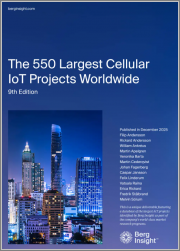
|
시장보고서
상품코드
1798806
IoT 셀룰러 모듈 모델 추적 조사 : 시장 데이터 개요(2025년 3분기)IoT Cellular Modules Model Tracker Market Data Overview: 3Q 2025 |
||||||
※ 본 상품은 영문 자료로 한글과 영문 목차에 불일치하는 내용이 있을 경우 영문을 우선합니다. 정확한 검토를 위해 영문 목차를 참고해주시기 바랍니다.
이 보고서에서는 IoT 셀룰러 모듈 모델 동향을 조사하고, IoT 셀룰러 모듈의 벤더, 기술, 주파수 대역, 폼팩터 등 다양한 분류별 분류, 시간 경과에 따른 변화 등을 정리했습니다.
실용적인 장점:
- 기술 세대 및 UE 카테고리별 모듈 모델의 가용성을 파악할 수 있습니다.
- 데이터를 조작하여 시간이 지남에 따라 개별 셀룰러 모듈 기능의 추세를 파악할 수 있습니다.
- 미국 통신사 및 2개의 국제 인증기관을 포함한 인증기관을 통해 어떤 모듈이 인증을 받았는지 파악할 수 있습니다.
- 최신 모듈 모델에 통합된 칩셋과 그 진화 과정을 확인할 수 있습니다.
중요한 질문에 대한 답변:
- 사용 가능한 모듈 중 개별 벤더의 모델 포트폴리오에 속하는 비율은?
- 디바이스 OEM의 요구가 진화하는 가운데, 모듈 공급업체는 어떤 연결 표준을 우선시하고 있는가?
- 시간이 지남에 따라 어떤 제품 기능이 점점 더 많이 보급되고 있는가?
- IoT 모듈 시장에서 가장 널리 사용되는 칩셋 제조업체와 칩셋 유형은?
조사 하이라이트:
- 2,361종의 IoT 셀룰러 모듈 모델: 벤더, 기술, 주파수 대역, 폼팩터, 모뎀, 부가기능, 시장 출시 및 철수시기별
- 지난 업데이트 이후 260개의 새로운 모델이 출시되었으며, 그 중 5G RedCap과 LTE Cat-1bis가 눈에 띄게 증가했습니다.
- 세계 최초의 비지상망(NTN) 지원 칩셋을 IoT 셀룰러 모듈에 통합한 최초의 사례
- 위의 모든 데이터에 대한 대화형 시각화
목차
이 제품은 IoT 셀룰러 모듈 모델 추적 조사(MD-ICM-106)와 함께 읽어 주세요.
주요 조사 결과
신착 정보
조사 방법
모듈 모델의 발매 하이라이트
모뎀 제조업체별 내역
시장 투입제셀룰러 모듈에서 Qualcomm의 통합 상황
5G RedCap 모듈 모델의 최신 정보
첫 NTN 대응 모듈 발매
Cat-1 대 Cat-1 bis 모듈 모델의 최신 정보
KSA 25.09.04Actionable Benefits:
- Understanding the availability of module models by technology generation and UE Category (“Cat”).
- Manipulate the data to reveal the trends behind individual cellular module features over time.
- Establish which modules have been certified by certifying bodies, including U.S. carriers, and two global groups.
- Determine which chipsets are being integrated into the latest module models, and how that is evolving.
Critical Questions Answered:
- What share of available modules are attributed to an individual vendor’s model portfolio?
- Which connectivity standards are module vendors prioritizing, as device Original Equipment Manufacturer (OEM) demands evolve?
- Which product features are becoming ubiquitous over time?
- Which chipset manufacturers, and chipset types, are the most prevalent in the market for Internet of Things (IoT) modules?
Research Highlights:
- 2,361 IoT cellular module models catalogued by vendor, technology, spectrum bands, form factor, modem, value-added features, and in & out of market dates.
- 260 new model launches since the previous update, with notable a increase in 5G Reduced Capability (RedCap) and Long Term Evolution (LTE) Cat-1bis.
- Integration of the world’s first Non-Terrestrial Network (NTN)-capable chipsets into IoT cellular modules.
- Interactive visualizations for all the above data.
Who Should Read This?
- Wireless carriers who wish to know which vendors have what products, and what to expect to see on their networks.
- Module vendors who wish to compare their portfolios, and to research their competitors and technology trends.
- Semiconductor manufacturers who wish to see their competitors’ chipset deployments, and to study the emerging connectivity trends of the latest IoT modules.
TABLE OF CONTENTS
This product is meant to be read in conjunction with IoT Cellular Modules Model Tracker MD-ICM-106
Key Findings
Whats New
Methodology
Module Model Launch Highlights
Modem Manufacturer Breakdown
Qualcomm Integration in In-Market Cellular Modules
5G RedCap Module Model Update
First NTN Module Launches
Cat-1 Versus Cat-1bis Module Model Update
샘플 요청 목록


















